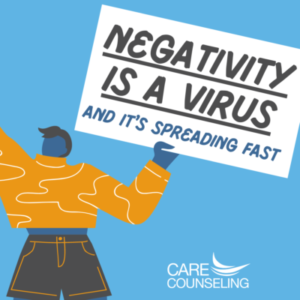 For many of us, we tend to get stuck on negative thinking. For some reason, our brains defer to the negative. According to the National Science Foundation, 80% of our thoughts are negative and 95% of our thoughts are repetitive. WOW. That is a lot of negative, repetitive thoughts!
For many of us, we tend to get stuck on negative thinking. For some reason, our brains defer to the negative. According to the National Science Foundation, 80% of our thoughts are negative and 95% of our thoughts are repetitive. WOW. That is a lot of negative, repetitive thoughts!
We all have thoughts and feelings about ourselves and important aspects of our life—relationships, work, school. We may find our brain “stuck” on the past, unable to let go. Anxious and depressive thinking can impact our ability to be fully present in the future, especially when expending time and energy worrying about the future.
Exactly how many thoughts do we have? Researchers at Queen’s University in Canada estimated that we have 6,200 thoughts-every-day. Researchers were able to establish a way to identify when thought ends and begins thorough isolating “thought worms” which are moments of being fixed on the same idea.
Here are some common examples of negative thought patterns:
Pessimism:
- Our “mental filter” focuses on the negative. We may minimize the positives and may “spiral” into depressive thinking.
Catastrophizing:
- Making small problems into big problems or “worst-case scenarios”, assuming the worst will happen.
Rumination:
- Repetitive thought(s) in which your brain tends to get “stuck” on negativity.
- Individuals may find that they have a hard time moving on. They may struggle with obsessions and experience anxious distress.
Perfectionism:
- Placing unrealistic high standards on self.
- Individuals may find themselves being hyper-critical; feeling like a “failure” when standards are not met.
Negative and repetitive thought patterns are present in both anxiety and depression. There are many cognitive-distortions present in negative thinking. These distortions can be treated with cognitive-behavioral therapy, using techniques such as cognitive-restructuring.
Other helpful interventions include:
- Practicing gratitude
- Surrounding yourself with positive people
- Increasing awareness of negative self-talk and replacing it
- Establishing new rituals/ habits within your routine
- Learning how to “let go” of negativity and practice self-compassion.
Written by Charlotte Johnson, MA, LPCC
We’re Here to help
Our wellness experts will be happy to take care of you. You can CLICK HERE to schedule an appointment now or call (612)223-8898.
Meet Clinicians
We’re united by our commitment to providing effective, relevant, and innovative mental health support at all stages of your journey. Click Here to find out more about who we are, where we come from, and how we live out CARE’s mission every day.
The professionals at CARE are actively collecting and creating resources to help with what you need. We’re Here for You.



